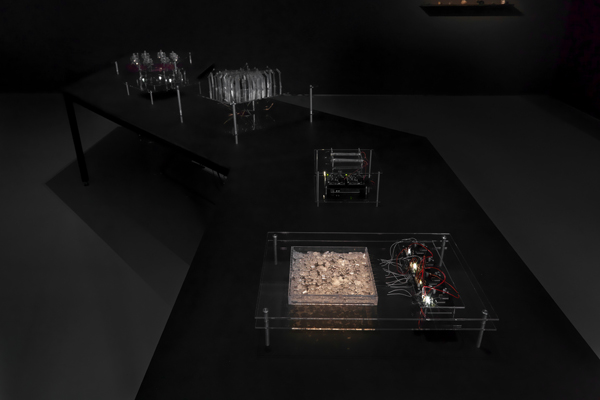RALF BAECKER [DE]
Irrational Computing (2011)
IRRATIONAL COMPUTING investigates material, aethetics and potential of digital processes. The basic raw materials of our surrounding information technology are semiconductor crystals such as silicon, quartz or silicon carbide, which, thanks to today’s advanced microtechnology and extremely sophisticated procedures, are processed into transistors or integrated circuits (IC), with the materiality of modern microprocessors having long since ceased to be graspable. The extreme miniaturization and the black-box set-up elude visual interpretation. The Installations circuit runs counter to the developments in information technology, representing the system in a dimension that is enlarged many times over. The project thus corresponds to an extreme zooming-in on the smallest “physical” units of digital processes.
The installation consists of five interlinked modules that use the varied electrical and mechanical particularities and characteristics of crystals and minerals and, through their networking, form a kind of primitive macroscopic signal processor. The crystals used for the purpose are either taken directly from nature, industrial waste products or have been especially cultivated for the purpose. A silicon carbide crystal, for example, is made to light up at numerous points with the help of electrodes (LED). On the crystal piece, there appears a kind of display, which is targeted by the data flows generated by other modules. At the same time, the crystal functions as a sound generator, since the electrical impulses change the surface of the crystal, causing it to vibrate. Via loudspeakers, these microscopic reverberations are made audible for visitors.
Digital systems, in their function, are conceived logically and rationally. The lowest physical or electro-technical level (crystals with semiconductor properties) are based, however, on quantum mechanical, i.e. statistical or unpredictable processes. Modern computer technology has thus tamed and domesticated the chaotic, so to speak. In his work, Ralf Baecker comments on this paradox by examining the aesthetics of the materials from which has developed a global digital network. “Irrational Computing” is not supposed to “function” – its aim is to search for the poetic elements on the border between “accuracy” and “chaos.”
Irrational Computing / Documentation from Ralf Baecker on Vimeo.
Bio
Ralf Baecker (DE) works as an artist in the fields of visual and media art. He has studied computer science and media art in Cologne. He was teaching fellow at the Bauhaus University Weimar (DE) and University of the Arts Bremen (DE). Baecker builds installations and sculptures that deconstruct the fundamental elements of symbolic processes. His work has been exhibited internationally. eg. ZKM Karlsruhe (DE), Konsthall Malmö (SE), NiMK Amsterdam (NL), Martin-Gropius-Bau Berlin (DE), Laboral Centro de Arte Gijon (ES), Center for Contemporary Art WINZAVOD Moscow (RU).
http://www.rlfbckr.org/work/irrational_computing



 English
English